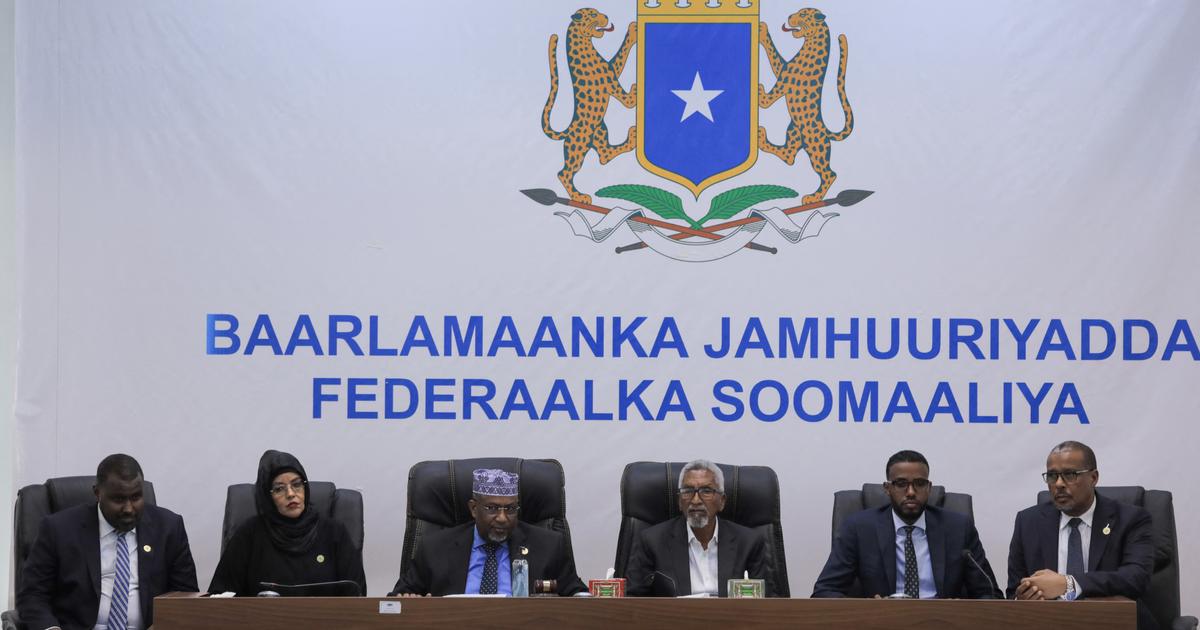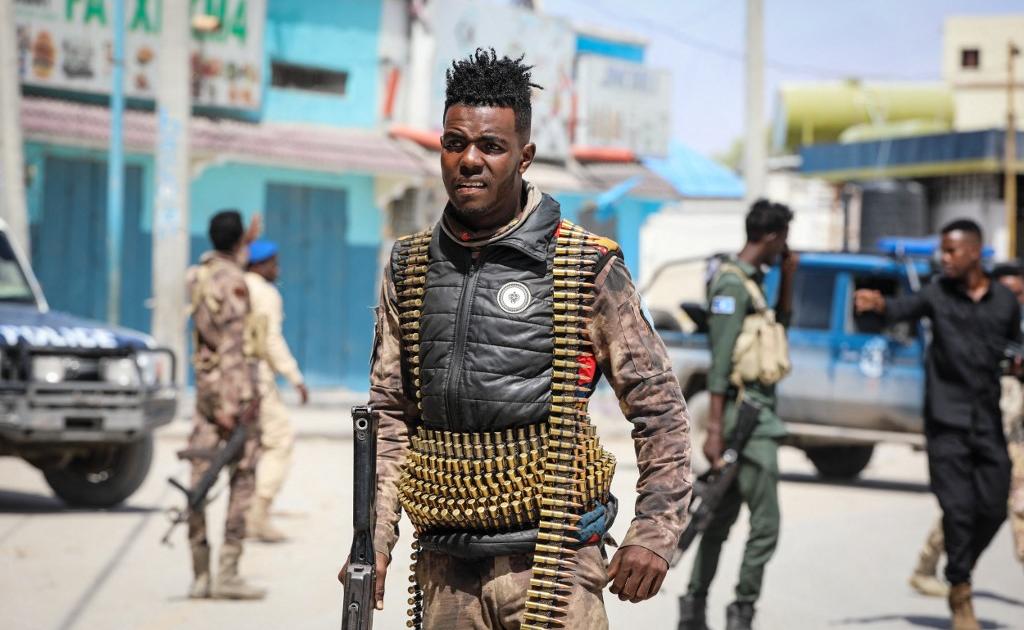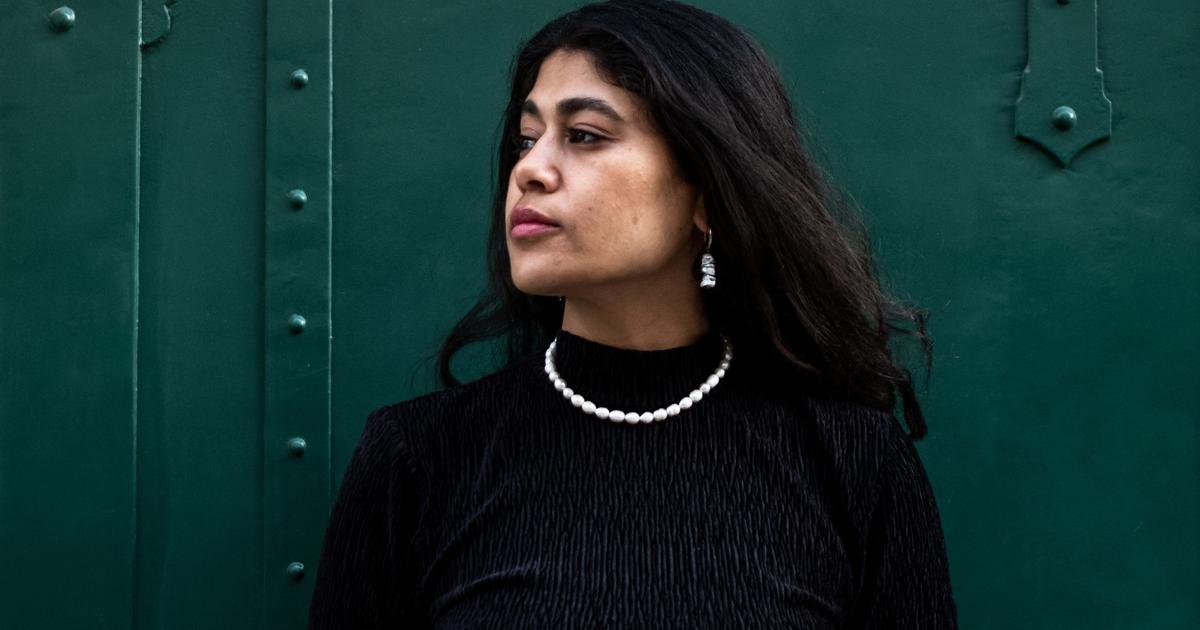Enlarge image
Election in Somalia: The crisis country does not come to rest
Photo: Farah Abdi Warsameh / dpa / AP
A strictly sealed hangar in the high-security military zone, 328 MPs elect a president – this is what democracy looks like in Somalia, or rather the hope for democracy.
After all: In the end, a new head of state was determined in the night from Sunday to Monday: Hassan Sheikh Mohamud.
He was president from 2012 to 2017, now he should steer the country towards a better future.
Really not an easy task.
Large parts of the country are still controlled by the Islamist terrorist militia al-Shabab, and the power of the government extends just over a few blocks in Mogadishu and other major cities.
US President Joe Biden apparently wants to send troops back to the East African country, which his predecessor Donald Trump withdrew during his tenure.
In addition, a drought spreads to a devastating famine, hundreds of thousands of people are fleeing.
DER SPIEGEL spoke to security expert Samira Gaid from the Somali think tank Hiraal Institute about the impending catastrophe, briefcase politicians and al-Shabab's tax policy.
DER SPIEGEL
: The elections finally took place on Sunday, 15 months late.
Will everything still be fine in Somalia after all?
Gaid
: It can only get better.
Somalia was on hold for 15 months.
Before that, the country experienced four years of a very polarizing presidency.
I think Somalis really want change.
In his opening speech yesterday, the new head of state spoke of reconciliation.
Somalis want the tensions of the last five years to ease.
SPIEGEL
: But at the same time, the new president Hassan Sheikh Mohamud is also a former president whose previous term of office from 2012 to 2017 was overshadowed by allegations of corruption.
This doesn't look like a fresh start.
Gaid
: The MPs I spoke to didn't want to vote for a new face.
Five years ago they elected Farmajo (
editor's note: the deselected incumbent
) as the new face.
Before that, they chose Hassan Sheikh Mohamud himself as the new face.
This time they wanted someone who was proven and knew their limits.
Someone who can unite, who seeks dialogue.
The allegations surrounding his presidency have mainly involved people from his team and he has indicated he wants to do things differently this time.
But it's true, it's not a hard new start.
SPIEGEL
: Instead of "one person, one vote," the president is elected by 328 members of parliament, who in turn are appointed by clan delegates.
Somalia has what is probably the most complicated electoral system in the world.
Gaid
: Yes, we are still a long way from an ideal democracy.
And that's because the political elite wouldn't want it any other way.
They want to determine who gets into parliament, because that way they always remain relevant.
At the same time, the security situation is cited as a reason why we cannot implement “one person, one vote”.
This is more to the advantage of the political elite - and to the disadvantage of the Somali people, who cannot choose their leadership themselves.
SPIEGEL
: There were also allegations of vote-buying.
Gaid
: The presidential election itself here in Mogadishu was the freest and fairest election the country has ever seen.
But the steps before that, the selection of clan delegates and thus the election of MPs, were riddled with corruption.
There was a lot of manipulation, more than ever before.
SPIEGEL
: Angry gossips say that the election was only held because otherwise an international aid package worth millions would not have been approved.
Gaid
: That's 100 percent true.
If it hadn't been for this international pressure, the election would have dragged on for much longer.
Without this pressure, the Somalis risked losing patience, resorting to violence and fighting one another.
SPIEGEL
: Before the election, there were fears that al-Shabab sympathizers could seek mandates as MPs.
Did that come true?
Gaid
: I can't say for sure, but those fears remain.
They probably wouldn't do it so overtly.
However, there is a new MP who gave a speech in the area occupied by al-Shabab before the election.
He later justified himself by saying that he lives there and had to attend the meeting.
Those are the most obvious connections.
But there are many other references that cannot be seen at first glance in the complicated Somali context.
SPIEGEL
: Al-Shabab still controls large parts of Somalia, even though African Union troops have been fighting the terrorist group for years.
Does the new president have any chance of defeating the Islamists?
Gaid
: The fight against al-Shabab requires a coordinated approach.
It doesn't just need a military response, but one that involves society as a whole.
Hopefully the new President understands this better.
He was also the head of state when the major military offensives were launched to drive al-Shabab out of the cities.
But it has now become much more difficult than it was at the beginning of his last term.
Al-Shabab has changed.
African Union troops are about to withdraw.
While the Somali security forces have been strengthened, they are also divided.
So there is still a lot to do.
SPIEGEL
: Al-Shabab collects taxes and has set up its own - Islamist - judicial system in the areas it controls.
So far, the government has looked on helplessly.
Gaid
: The government controls the big cities and al-Shabab controls the hinterland.
The Somali government must therefore take action beyond the cities.
People use al-Shabab's legal system because the government itself cannot deliver justice.
They use al-Shabab's education system because the government doesn't create educational institutions.
The government must get out of the capital and offer the Somalis an alternative.
But these briefcase politicians don't dare leave the cities, that's no way to defeat al-Shabab.
SPIEGEL
: At the same time, Somalia is suffering from a massive drought that is currently escalating into a catastrophic famine.
Gaid
: Yes, Somalia urgently needs to sit down with the international community.
The country needs a functioning ministry to deal with the drought and ensure aid gets to where it is needed.
At the moment the politicians are completely occupied with the electoral process.
It will be about a month before a prime minister is appointed and a cabinet is formed.
This significantly affects the response to the drought.
So far, the international community has tackled the matter alone.
This contribution is part of the Global Society project
Expand areaWhat is the Global Society project?
Under the title "Global Society", reporters from
Asia, Africa, Latin America and Europe
report on injustices in a globalized world, socio-political challenges and sustainable development.
The reports, analyses, photo series, videos and podcasts appear in a separate section in SPIEGEL's international section.
The project is long-term and is supported by the Bill & Melinda Gates Foundation (BMGF).
A detailed FAQ with questions and answers about the project can be found here.
AreaWhat does the funding look like in concrete terms?open
The Bill & Melinda Gates Foundation (BMGF) has been supporting the project since 2019 for an initial three years with a total of around 2.3 million euros - around 760,000 euros per year.
In 2021, the project was extended by almost three and a half years until spring 2025 under the same conditions.
AreaIs the journalistic content independent of the foundation?open
Yes.
The editorial content is created without the influence of the Gates Foundation.
AreaDo other media also have similar projects?open
Yes.
With the support of the Gates Foundation, major European media outlets such as The Guardian and El País have set up similar sections on their news sites with Global Development and Planeta Futuro respectively.
Did SPIEGEL already have similar projects? open
In recent years, SPIEGEL has already implemented two projects with the European Journalism Center (EJC) and the support of the Bill & Melinda Gates Foundation: the "OverMorgen Expedition" on global sustainability goals and the journalistic refugee project "The New Arrivals ", within the framework of which several award-winning multimedia reports on the topics of migration and flight have been created.
Expand areaWhere can I find all publications on the Global Society?
The pieces can be found at SPIEGEL on the Global Society topic page.









